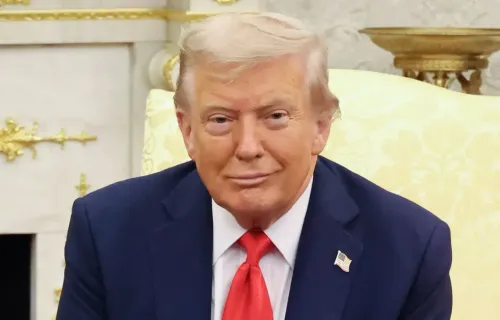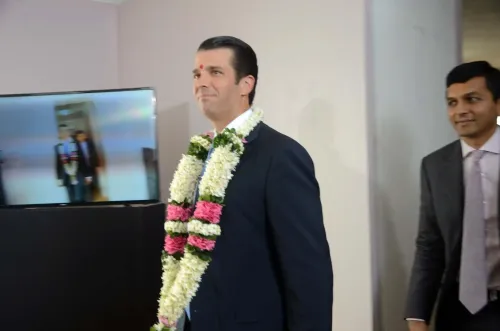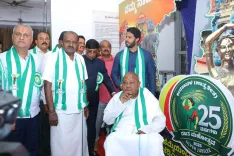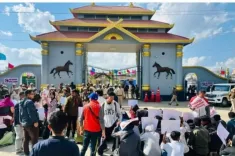Did KTR Commit Any Wrongdoing After Governor's Approval for Prosecution?
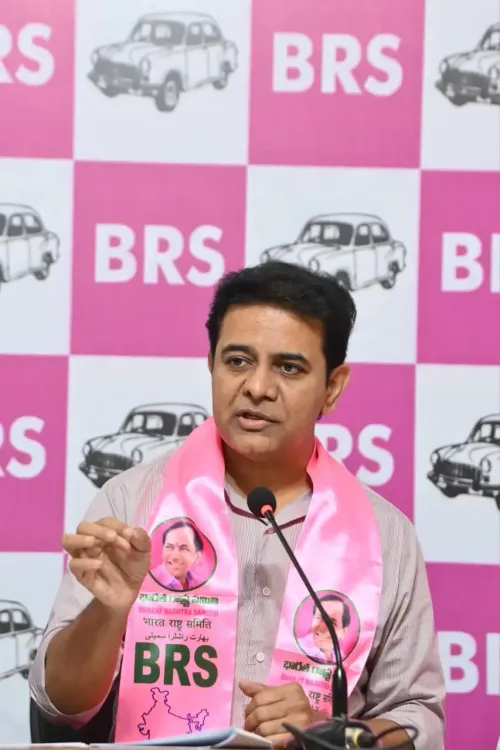
Synopsis
Key Takeaways
- KTR insists on his innocence amid prosecution.
- Allegations point to a major land scam in Telangana.
- The HILTP is under scrutiny for potential corruption.
- Public vigilance is crucial against political misconduct.
- Legal consequences may follow for those involved in the HILTP.
Hyderabad, Nov 21 (NationPress) Just a day after Telangana Governor Jishnu Dev Varma sanctioned the prosecution of Bharat Rashtra Samithi (BRS) working president K. T. Rama Rao in connection with the Formula E race case, the former minister firmly stated on Friday that he has done nothing wrong.
Responding to a query during a press conference, he remarked, "The law will take its own course. We have no objections to that."
KTR emphasized, "I have reiterated this numerous times, I have done nothing wrong," and expressed his willingness to undergo a lie-detector test.
Previously, KTR had challenged Chief Minister A. Revanth Reddy to join him in a lie-detector test, noting that Reddy also faces an Anti-Corruption Bureau (ACB) case.
The former minister has appeared before the ACB four times regarding the Formula E race case, which involves the alleged misuse of Rs 54.88 crore in public funds during the BRS administration.
KTR accused Chief Minister Revanth Reddy of attempting to orchestrate a massive Rs 5 lakh crore land scam through the newly introduced Hyderabad Industrial Lands Transformation Policy (HILTP).
Labeling it as one of the largest land scams in India, KTR asserted that the policy is designed to benefit a network of politically connected middlemen, relatives, and real estate firms aligned with the Chief Minister.
KTR clarified that the HILTP, which the Congress government presents as a land regularization and transformation initiative, is actually a calculated effort to convert thousands of acres of valuable industrial land into multi-use real estate at significantly reduced prices.
He disclosed that the policy aims to regularize approximately 9,292 acres of prime industrial zones in key regions like Balanagar, Jeedimetla, Sanathnagar, and Azamabad. Considering the current market price of these lands, estimated between Rs 40 to Rs 50 crore per acre, the total market value is between Rs 4 lakh crore to Rs 5 lakh crore.
KTR expressed concern over the "unusual speed" with which the policy is being processed: applications are being handled in seven days, approvals in seven days, and full regularization in just 45 days. "Why this rush?" he questioned.
He alleged that Revanth Reddy's associates have already entered into pre-arranged agreements regarding these lands, claiming that deals were made even before the policy received final approval.
"Revanth is trying to transfer these lands for only 30 percent of the government's outdated SRO rate, while their market value is several times higher," he claimed, noting that even the SRO value is not being fully collected.
KTR reminded citizens that industrial lands were historically allocated at very low or subsidized rates to foster employment and economic activity. Many of these lands were obtained from farmers specifically for industrial use.
"The goal was to create jobs and stimulate production. However, those very lands, once acquired from the people, are now being regularized for private gain," he stated.
KTR recalled rejecting similar offers from brokers and landowners during the BRS period, emphasizing that "public land cannot be sold cheaply for private benefit."
KTR issued a strong warning to industrialists and developers engaging in transactions under the HILTP: "Those who buy land under this policy will face serious legal consequences in the future. These deals will not hold up. The land will be reclaimed."
He asserted that the BRS government, once reinstated, will annul the regularization, launch a comprehensive investigation, and pursue criminal actions against all implicated in the scam.
KTR challenged the BJP to oppose the policy and cautioned the people of Telangana to remain alert against what he referred to as a "daylight robbery" of public assets.
He accused the state Congress and the central government of functioning as a joint venture, supporting each other's corruption.



